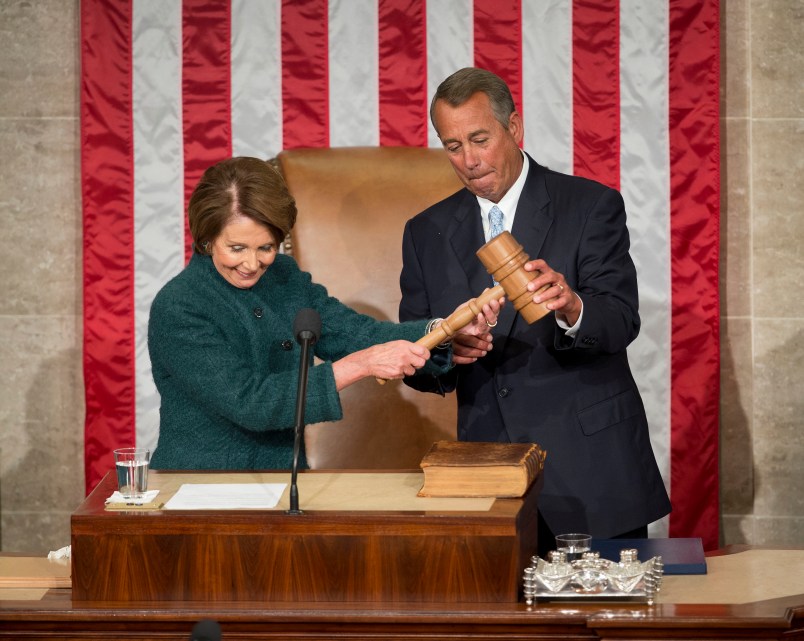WASHINGTON — An ambitious agreement by Speaker John Boehner and Minority Leader Nancy Pelosi to fix a major funding gap in Medicare and make some separate long-term cuts appears in good shape to pass the House.
A floor vote is planned for Thursday, House leadership aides said, after the top Democrat and Republican successfully resolved concerns about abortion language.
“It is all shaping up very well on both sides,” said Kevin Smith, a spokesman for Boehner.
The legislation would eliminate the “doc fix” problem that has become one of Washington’s most despised rituals. The existing Medicare formula for paying doctors imposes steep annual cuts that Congress has overridden for more than a decade. Doctors face a 21 percent cut if no “fix” is enacted by April 1.
At a cost of roughly $210 billion, the bill replaces the “sustainable growth rate” formula to instead give doctors gradual raises while extending the Children’s Health Insurance Program for two years starting in October. It includes $70 billion in offsets by making two structural changes to cut Medicare spending: force high-income seniors to kick in more for their care and reduce spending on supplemental Medigap plans, specifically “first dollar” coverage.
The rest of the legislation is not paid for, which could be a deal-breaker for hardline conservatives in the House and Senate. But even some staunch conservatives support the proposal, including Rep. John Fleming (R-LA).
Progressives don’t love the Medicare cuts but many Democrats are willing to accept them because they don’t touch core benefits for middle-class Americans.
The deal faced a last-minute threat in the House due to an anti-abortion provision. But Pelosi and Boehner struck a compromise to include “clarifying language” that says the bill only maintains the status quo with regard to restricting taxpayer funded abortion and that the provision is temporary, according to aides in both parties.
The co-chairs of the Pro-Choice Caucus endorsed the bill.
“The language included in the bipartisan compromise does not further restrict women’s access to abortion, and the provisions expire along with funding—just as the current Hyde Amendment does,” Reps. Louise Slaughter (D-NY) and Diana DeGette (D-CO) said in a joint statement Tuesday. “We will be supporting this bipartisan compromise, and we encourage other members of the Pro-Choice Caucus to do the same.”
A House Republican leadership aide said, “It was amenable to both our pro-lifers and their pro-choicers. How often do you see that?”
Senate Democrats don’t like the abortion language and some of them have threatened to scuttle the deal because it doesn’t extend CHIP for as long as they want to — they want a minimum four-year extension. But it’s far from clear they’ll unite to filibuster the deal.
Notably, Senate Minority Leader Harry Reid (D-NV) is keeping his powder dry.
“I personally am going to wait until we see it having passed the House before we start speculating on what we need to do with it, if anything,” he told reporters Tuesday.
Senate Republicans are eager to get rid of the “doc fix” problem, and the long-term Medicare cuts in the House package are an enticement for them.
Sen. Richard Burr (R-NC) said the deal was a “very positive” step.
“I’ve been working on entitlement reform since I got here 21 years ago. This is the first real hope at getting entitlement reform and in the process taking care of the SGR which we’ve always known was a mythical cut,” he told TPM shortly before the agreement was unveiled.
One obstacle is time. Congress is scheduled to leave for a two-week recess at the end of this week, and it’s unlikely that both the House and Senate will pass the bill before they adjourn. So there may be a short-term patch to avoid a cut to physician payments on April 1 and buy more time.
Sen. John Barrasso (R-WY), a physician and a Republican leader, said he’s “solidly behind eliminating the SGR.”
“I want to get it on the floor and I want to get it voted on,” he told TPM. “When I was practicing medicine in Wyoming I would come here to lobby my then-United States senators about why we needed to get rid of this SGR model, why it was bad. Now the doctors are coming to lobby me. … It’s time to get this done.”







We shall see…
Let me tell you what’s going to hold up every major piece of legislation for the next two years.
Abortion and repealing Obamacare.
I’d like to hear from the people who call themselves conservative. Aren’t you upset that your party has boiled itself down to these two issues? Especially since many of the abortion bills represent big government intrusions into people’s lives and repealing Obamacare would increase the deficit considerably?
But if you complain about things getting held up, they’ll just tell you that’s their intention, that the best they can hope for under the dreaded Obamanation is that nothing gets done, just trying to survive until 2017 when we get a REAL leader, massive resistence, yada yada…
You mean to tell me that Congress is ready to do what it is supposed to do…actually legislate?
Spot on!
“I left a smaller deficit and federal government than I inherited…said no Republican in more than half a century.”
Amazing that the Greedy Olde Party gets away with their hypocrisy and bullsh*t, and, of course, they do it piggy-backed on “culture wars” red herring issues for their racist, hate filled, bigoted, rube and low/no info ‘base’!